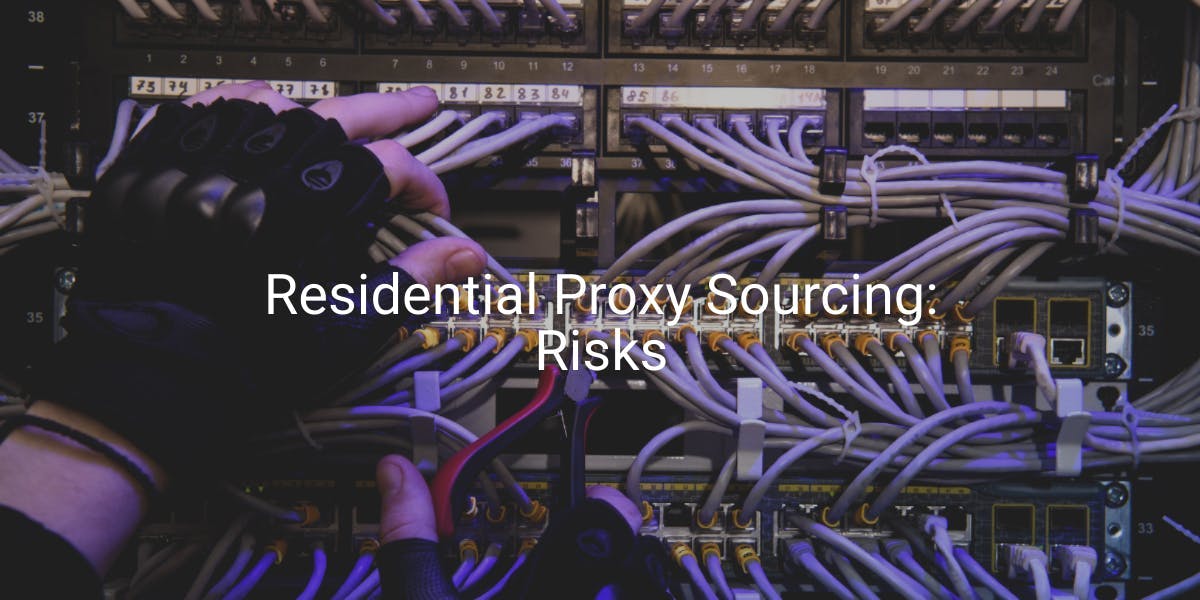What Is a Distorting Proxy & How Does It Work?
Flipnode on Mar 31 2023
If you want to bypass blocks while scraping at scale or browse the internet anonymously, a high-quality proxy solution can help. It will conceal your identity, enable access to geo-restricted content, and prevent you from encountering complex anti-scraping systems on websites.
There are various types of proxies, such as anonymous, transparent, shared, and reverse. It is essential to understand their functionalities to select the most appropriate one based on your business's requirements.
This article will concentrate on distorted proxies. You will discover what they are, how they function, and whether they are suitable for your specific use case.
What is a distorting proxy?
A distorting proxy is a kind of proxy server that conceals the user's actual IP address by inserting a fabricated one into the HTTP (HyperText Transfer Protocol) header. This creates the illusion that the user is located elsewhere, enabling them to access remote websites while maintaining their anonymity.
How does distorting proxy differ from other proxy types?
One way a distorting proxy can be distinguished from other types of proxies is based on the three levels of anonymity available in proxy servers: high anonymity, anonymous, and transparent. Among these, a distorting proxy can be placed in the middle – below “elite” (e.g., residential proxies that use real IP addresses, making it harder for targets to flag them) but ensuring more anonymity than transparent proxies. This makes a distorting proxy a good solution for bypassing content restrictions and protecting oneself from targeted marketing.
How a distorting proxy works
As you may already be aware, every device connected to the internet has a unique IP address that discloses the user's geographic location and personal details, such as their street name, city, and ZIP code. Similar to other proxy servers, a distorting proxy functions as a middleman between you and the internet, safeguarding your identity by providing a fictitious IP address in the HTTP header. It then sends your request to your desired website and transmits its response back to you.
Distorting proxy use cases
Let's have a look at some of the most popular use cases of a distorting proxy, now that you know what it is and how it differs from other types of proxies.
Identity protection
The primary function of a distorting proxy is to protect your identity by providing you with a false IP address. This significantly increases privacy and prevents hackers or malicious websites from accessing your sensitive information.
Location-restricted content
A distorting proxy is also an excellent solution for accessing geo-blocked content. It creates the impression that you're browsing from a different location, making it easy to bypass geo-restrictions and access the public information you require. However, it's worth noting that targets can still detect a distorting proxy and prohibit you from accessing a specific URL.
Caching
Distorting proxy servers can be used for caching purposes, much like transparent proxies. By supporting fast caching, they help users access different websites with decreased load time and reduced bandwidth usage.
Web scraping
Distorting proxies are also commonly used in web scraping, as they are great at protecting one's identity and bypassing IP blocks, allowing access to highly-localized information. However, it's essential to keep in mind that distorting proxies are not as reliable and anonymous as premium proxies (residential or datacenter), meaning that remote websites may identify and block them over time. To work around this issue, using high-quality rotating proxies in your scraping jobs, which assign a new IP address for every connection, can make your activities untraceable and allow for smooth and block-free data gathering.
Advantages and disadvantages of distorting proxies
To determine if distorting proxies are the best choice for your needs, it's crucial to carefully consider their advantages and disadvantages. The following points are particularly worth noting:
Pros of using distorting proxies
- Increased anonymity - with a distorting proxy, your actual IP address is not just hidden, but a false one is presented instead. This feature enhances your privacy while browsing the internet or conducting scraping tasks.
- Convenient access to location-restricted content - governments monitor online activities closely, and many websites have location-based restrictions. A distorting proxy is an effective workaround that provides access to content from a different location by assigning you a false IP address.
Cons of using distorting proxies
- Inconsistency - Distorting proxies may not be reliable enough for more complex tasks like web scraping, as they can be identified and blocked by remote websites. This can prevent you from accessing the public data you need.
- Security risks - While distorting proxies may provide protection from hackers and cybercriminals by hiding your IP address, it's important to consider where these false IPs come from and how they were obtained. As it can be difficult to answer these questions with distorting proxies, there is a higher risk of security breaches.
The risks of using free distorting proxy lists
As is the case with any other proxy server, it is not advisable to use free distorting proxy lists. These free proxies contribute to slower loading times, increase the risk of online monitoring, and often expose users to numerous malicious advertisements. Additionally, using free proxies puts your sensitive data at risk of being leaked. This is because these proxies frequently do not use the HTTPS protocol to ensure that your connection is encrypted. Consequently, hackers can steal sensitive data such as credit card and bank login information, usernames and passwords, search history, and activities on the websites you visit.
For further reading on why free proxies are unsuitable for web scraping and other online activities, refer to our extensive blog post on this subject.
Summing up
The idea of distorting proxies, which is to offer a fake IP address to maintain online anonymity, may seem like an excellent solution. Nevertheless, these proxy servers come with significant drawbacks that can cause more harm than good to you and your business.
Although these proxies may suffice for simpler tasks such as safeguarding your identity during online research, we suggest opting for premium proxies like residential or datacenter proxies when performing intricate web scraping tasks or browsing the internet securely.



